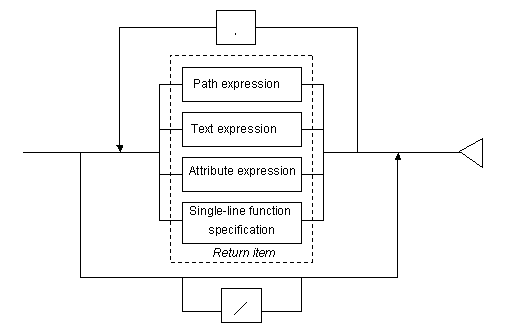

| Interstage Shunsaku Data Manager Application Development Guide - Microsoft(R) Windows(R) 2000/ Microsoft(R) Windows Server(TM) 2003 - - UNIX - |
Contents
Index
 
|
| Appendix B Format of Search, Return and Sort Expressions | > B.4 Return Expressions |
To return the entire record, specify '/' in the return expression.
The entire record will also be returned if an empty string '' is specified in the return expression.

To return only certain element nodes or element values, specify either a path expression or a text expression. To return certain attribute values, specify an attribute expression. Single-line functions can also be specified to convert element values or attribute values. As shown in the following definition, multiple return items can be specified, separated by commas ','.
The return items are shown below.
 Path Expressions
Path ExpressionsThe path expression specifies which element nodes to return. The values of element nodes specified by the path expression are returned in XML format.
Refer to B.2.1 Path Expressions for more information on the format of path expressions.
Example
/root/company/name |
 Text Expressions
Text ExpressionsThe text expression is used to specify which text nodes to return. The (string) values of the text nodes specified by text expressions are returned in text format.
Refer to B.2.2 Text Expressions for more information on the format of text expressions.
Example
/root/company/name/text() |
 Attribute Expressions
Attribute ExpressionsThe attribute expression is used to specify which attribute nodes to return. The values of the attribute nodes specified by attribute expressions are returned in attribute format.
Refer to B.2.3 Attribute Expressions for more information on the format of attribute expressions.
Example
/root/company/employee/@position |
 Single-line Function Specification
Single-line Function SpecificationThe single-line function specification uses a function to convert the value indicated by the text expression or attribute expression passed as an argument. The results of single-line function specifications are returned in text format.
Refer to B.2.4 Single-line Function Specification for more information on single-line function specifications.
Example 1
rlen(/root/company/name/text(),10) |
Example 2
rlen(/root/company/employee/@position,10) |
Contents
Index
 
|